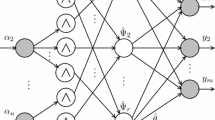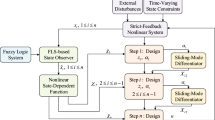Abstract
The conventional state-space form often leads to control design strategies and stability analysis techniques generally applicable to dynamical processes. Nevertheless, it may also lead to higher model complexity and loss of interpretability. Here, we skip this representation for nonlinear dynamical systems with high-order input derivatives and nonlinear input–output relationships. Specifically, we incorporate the principle of \({H}_{\infty }\) design within an observer-based adaptive fuzzy controller to guarantee robust stabilization and trajectory tracking for such nonlinear systems. The proposed approach has four integral components. Firstly, zero-order Takagi–Sugeno fuzzy systems approximate nonlinear and uncertain functions by the estimated states of the observer. Secondly, the \({H}_{\infty }\) control attenuates fuzzy approximation errors, observer errors, and environmental effects to a prescribed attenuation level. Thirdly, the adaptive laws and the \({H}_{\infty }\) term are met with simple equations, avoiding the positive definite matrices in Lyapunov equations. Fourthly, a compensation term is added to ensure the stability of the closed-loop system. Fifthly, the Lyapunov theory guarantees the asymptotic stability of the overall system and the \({H}_{\infty }\) tracking performance of the output. Finally, the proposed method is applied to two unknown nonlinear systems under disturbances, noises, packet loss, and asymmetric dead-zone. The first is a second-order spring-mass-damper trolley system, and the second is a third-order nonlinear system. Comparing the results with a recent competing controller reveals that the proposed approach improves transparency and lowers tunable parameters, fuzzy basis functions dimension, the observation and tracking errors, the consumed energies, and the settling times.




Similar content being viewed by others
Explore related subjects
Discover the latest articles, news and stories from top researchers in related subjects.References
Fliess, M., Levine, J., Martin, Ph., Rouchon, P.: Flatness and defect of non-linear systems: introductory theory and examples. Int. J. Control 61(6), 1327–1361 (1995)
Chen Y-Y., Gieng S-T., Liao W-Y., Huang T-Ch.: Micrometer level control design of piezoelectric actuators: Fuzzy approach. Int. J. Fuzzy Syst. 08 (2021)
Shafai B., Moradmand A., Nazari S.: Observer-based controller design for systems with derivative inputs. In: 2019 57th Annu. Allerton Conf. Commun. Control Comput., pp. 1038–1044 (2019)
Darrell, W.: Observation of bilinear systems with application to biological control. Automatica 13(3), 243–254 (1977)
Freedman, M., Willems, J.: Smooth representation of systems with differentiated inputs. IEEE Trans. Autom. Control 23(1), 16–21 (1978)
Glad S.T.: Nonlinear state space and input output descriptions using differential polynomials. In: New Trends in Nonlinear Control Theory, pp. 182–189. Berlin (1989)
Zhang, F., Hua, J., Li, Y.: Indirect adaptive fuzzy control of siso nonlinear systems with input-output nonlinear relationship. IEEE Trans. Fuzzy Syst. 26(5), 2699–2708 (2018)
Zhang, F., Li, Y., Hua, J.: Direct adaptive fuzzy control of siso nonlinear systems with input-output nonlinear relationship. Int. J. Fuzzy Syst. 20, 11 (2017)
Zhang, F., Chen, Y.Y.: Indirect adaptive fuzzy control for nonaffine nonlinear pure-feedback systems. IEEE Trans. Fuzzy Syst. 28(11), 2918–2929 (2020)
Zhang, F., Chen, Y.-Y.: Indirect adaptive fuzzy control with a new control input transformation. IFAC-PapersOnLine 55(3), 184–189 (2022)
Wang, L.-X., Mendel, J.M.: Fuzzy basis functions, universal approximation, and orthogonal least-squares learning. IEEE Trans. Neural Netw. 3(5), 807–814 (1992)
Mamdani, E.H., Assilian, S.: An experiment in linguistic synthesis with a fuzzy logic controller. Int. J. Man-Mach. Stud. 7(1), 1–13 (1975)
Wang, L.-X.: A Course in Fuzzy Systems and Control. Prentice-Hall Inc, New York (1996)
Golea, N., Golea, A., Benmahammed, K.: Stable indirect fuzzy adaptive control. Fuzzy Sets Syst. 137(3), 353–366 (2003)
Zhu, Z., Pan, Y., Zhou, Q., Lu, C.: Event-triggered adaptive fuzzy control for stochastic nonlinear systems with unmeasured states and unknown backlash-like hysteresis. IEEE Trans. Fuzzy Syst. 29(5), 1273–1283 (2020)
Liang, M., Chang, Y., Zhang, F., Wang, Sh., Wang, Ch., Lu, Sh., Wang, Y.: Observer-based adaptive fuzzy output feedback control for a class of fractional-order nonlinear systems with full-state constraints. Int. J. Fuzzy Syst. 24, 1046–1058 (2022)
Du, P., Pan, Y., Li, H., Lam, H.: Nonsingular finite-time event-triggered fuzzy control for large-scale nonlinear systems. IEEE Trans. Fuzzy Syst. 29(8), 2088–2099 (2020)
Li, Y., Qu, F., Tong, S.: Observer-based fuzzy adaptive finite-time containment control of nonlinear multiagent systems with input delay. IEEE Trans. Cybern. 51(1), 126–137 (2020)
Du, P., Sun, K., Zhao, S., Liang, H.: Observer-based adaptive fuzzy control for time-varying state constrained strict-feedback nonlinear systems with dead-zone. Int. J. Fuzzy Syst. 21, 12 (2018)
Su, H., Zhang, W.: Finite-time tracking control for a class of mimo nonstrict-feedback nonlinear systems via adaptive fuzzy method. Int. J. Fuzzy Syst. 24, 713–727 (2022)
Jiang, S., Tian, F.Q., Sun, S.Y., Liang, W.G.: Integrated guidance and control of guided projectile with multiple constraints based on fuzzy adaptive and dynamic surface. Def. Technol. 16(6), 1130–1141 (2020)
Sun, X., Zhang, Q.: Observer-based adaptive sliding mode control for t-s fuzzy singular systems. IEEE Trans. Syst. Man Cybern. Syst. 50(11), 4438–4446 (2020)
Cheng, W., Xue, H., Liang, H., et al.: Prescribed performance adaptive fuzzy control of stochastic nonlinear multi-agent systems with input hysteresis and saturation. Int. J. Fuzzy Syst. 24, 91–104 (2022)
Li, H., Sun, H., Hou, L.: Adaptive fuzzy pi output feedback control for a class of switched nonlinear systems with unmodeled dynamics and dead-zone output. Int. J. Fuzzy Syst. 24, 728–751 (2022)
Song X., Sun P., Song S., et al.: Event-triggered fuzzy adaptive fixed-time output-feedback control for nonlinear systems with multiple objective constraints. Int. J. Fuzzy Syst. (2022)
Li G., Yang R.: Observer-based hybrid-triggered control for nonlinear networked control systems with disturbances. Int. J. Fuzzy Syst. (2022)
Xie, L.: Output feedback \(h_\infty\) control of systems with parameter uncertainty. Int. J. Control 63(4), 741–750 (1996)
Chen, B.S., Lee, C.H., Chang, Y.C.: \(\text{ H}_\infty\) tracking design of uncertain nonlinear siso systems: adaptive fuzzy approach. IEEE Trans. Fuzzy Syst. 4(1), 32–43 (1996)
Pan, Y., Er, M.J., Sun, T., Xu, B., Yu, H.: Adaptive fuzzy pd control with stable \(\text{ h}_\infty\) tracking guarantee. Neurocomputing 237, 71–78 (2017)
Fallah-Gh, H., Kalat, A.: Observer-based robust composite adaptive fuzzy control by uncertainty estimation for a class of nonlinear systems. Neurocomputing 230, 100–109 (2017)
Baghbani, F., Akbarzadeh-T, M.-R., Akbarzadeh, A.: Indirect adaptive robust mixed \(\text{ h}_2\)/\(\text{ h}_\infty\) general type-2 fuzzy control of uncertain nonlinear systems. Appl. Soft Comput. 72, 392–418 (2018)
Xuhuan, X., Shanbin, L., Bugong, X.: Adaptive event-triggered \(\text{ h}_\infty\) fuzzy filtering for interval type-2 ts fuzzy-model-based networked control systems with asynchronously and imperfectly matched membership functions. J. Franklin Inst. 356(18), 11760–11791 (2019)
Fallah-Gh, H.: A modeling error-based adaptive fuzzy observer approach with input saturation analysis for robust control of affine and non-affine systems. Soft Comput. 24, 02 (2020)
Fallah-G. H., Akbarzadeh Kalat, A.: Observer-based hybrid adaptive fuzzy control for affine and nonaffine uncertain nonlinear systems. Neural. Comput. Appl. 30, 08 (2018)
Tong, S., Li, H.X., Wang, W.: Observer-based adaptive fuzzy control for siso nonlinear systems. Fuzzy Sets Syst. 148(3), 355–376 (2004)
Dong, Sh., Tang, Zh., Yang, X., Wu, M., Zhang, J., Zhu, T., Xiao, Sh.: Nonlinear spring-mass-damper modeling and parameter estimation of train frontal crash using clgan model. Shock Vib. 2020, 08 (2020)
Mull J-F., Durand C., Baudouin C., Bigot R.: A fe billet model and a spring-mass-damper model for the simulation of dynamic forging process: application to a screw press. In: Forming the Future, pp. 1131–1143 (2021)
Laurentiu, M., Agathoklis, G.: Optimal design of a novel tuned mass-damper-inerter (tmdi) passive vibration control configuration for stochastically support-excited structural systems. Probab. Eng. Mech. 38, 03 (2014)
Ahmadi, E., Caprani, C., Živanović, S., Heidarpour, A.: Experimental validation of moving spring-mass-damper model for human-structure interaction in the presence of vertical vibration. Structures 29, 1274–1285 (2021)
Wang, H., Chen, J., Nagayama, T.: Parameter identification of spring-mass-damper model for bouncing people. J. Sound Vib. 456, 13–29 (2019)
Zhang, L., Yang, G.: Low-computation adaptive fuzzy tracking control for nonlinear systems via switching-type adaptive laws. IEEE Trans. Fuzzy Syst. 27(10), 1931–1942 (2019)
Wu, C., Liu, J., Jing, X., Li, H., Wu, L.: Adaptive fuzzy control for nonlinear networked control systems. IEEE Trans. Syst. Man Cybern. Syst. 47(8), 2420–2430 (2017)
Author information
Authors and Affiliations
Corresponding author
Rights and permissions
Springer Nature or its licensor (e.g. a society or other partner) holds exclusive rights to this article under a publishing agreement with the author(s) or other rightsholder(s); author self-archiving of the accepted manuscript version of this article is solely governed by the terms of such publishing agreement and applicable law.
About this article
Cite this article
Hassani, M., Akbarzadeh-T, MR. Observer-Based Robust Adaptive TS Fuzzy Control of Uncertain Systems with High-Order Input Derivatives and Nonlinear Input–Output Relationships. Int. J. Fuzzy Syst. 25, 1400–1413 (2023). https://doi.org/10.1007/s40815-022-01438-1
Received:
Revised:
Accepted:
Published:
Issue Date:
DOI: https://doi.org/10.1007/s40815-022-01438-1




